【BBC六分钟英语】奶牛如何帮助预防西班牙的野火?
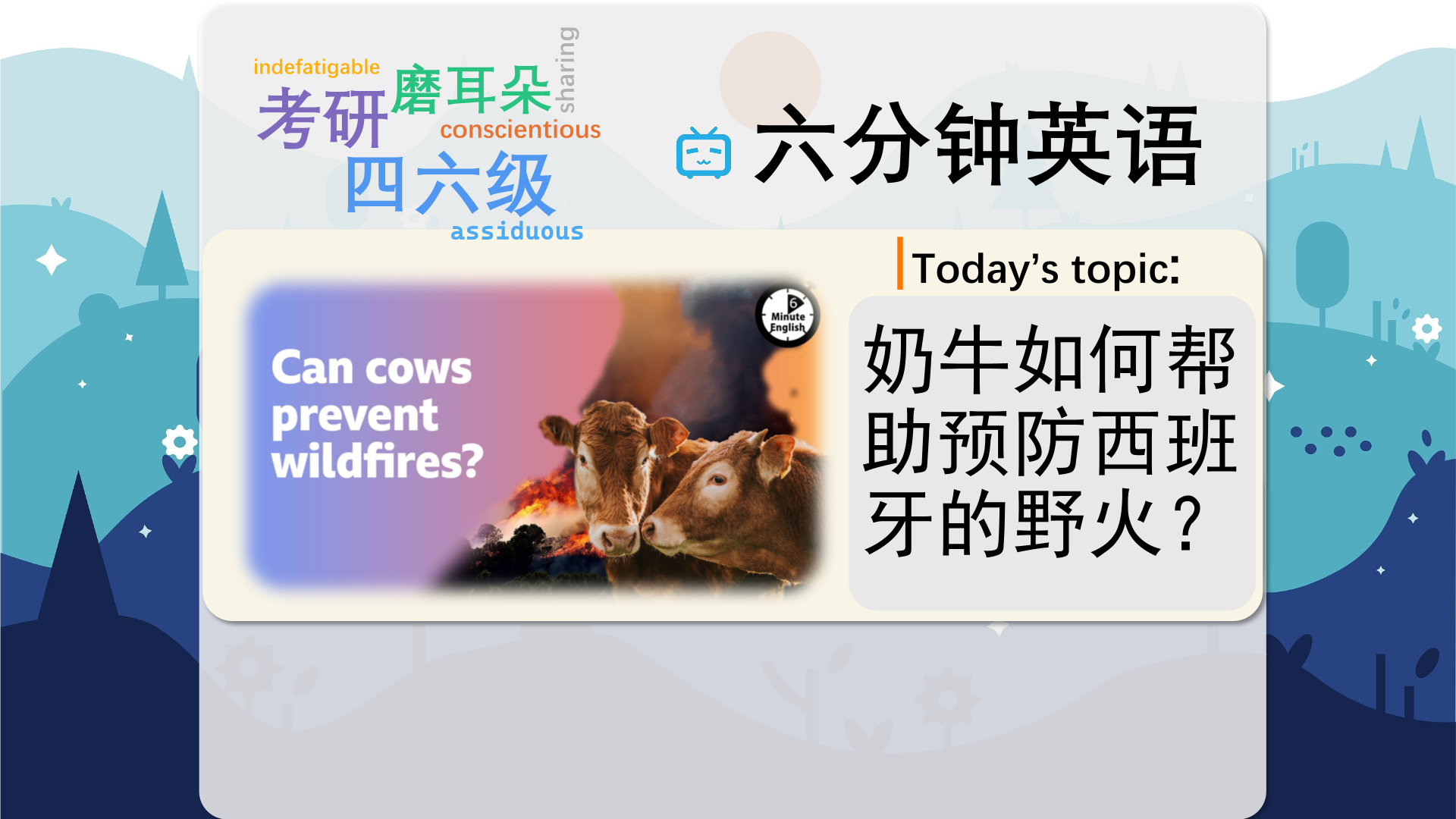
【英文脚本】
Neil
Hello, this is 6 Minute English from BBC Learning English. I’m Neil.
Beth
And I’m Beth. Neil, do you remember the children’s television show, Lassie?
Neil
Oh yes, of course. The show’s hero was a dog named Lassie. And Lassie went round helping people in trouble.
Beth
Yes. Well, if you watched Lassie as a child, you might also remember the TV shows, Flipper the Dolphin, and Skippy the Kangaroo. The stars of these shows were animals who would also come to the rescue of humans in trouble.
Neil
In this programme, we’ll be discussing some real-life animals helping people in trouble. It might sound strange, but we’ll be hearing how cows are helping to stop fires in Spain!
Beth
Well, now I have a picture in my head of a cow wearing a fireman’s helmet, but I guess that’s not what you mean, Neil.
Neil
Not quite, Beth, but you’re right about the fires, or wildfires to be exact. Wildfires are unplanned fires, in areas like forests or grasslands, which spread out of control. They often happen in hot dry countries like Spain.
Beth
So, how could cows help? We’ll be finding out and learning some useful new vocabulary as well. And remember, if you like to read along as you listen to the programme, you’ll find a script on our website, bbclearningenglish.com.
Neil
But now I have a question for you, Beth. Some wildfires are caused naturally, but most are the result of human activity. So, according to the Natural History Museum of Utah, what proportion of wildfires is caused by people? Is it: a) 2 out of every 5, b) 3 out of every 5, or c) 4 out of every 5?
Beth
I’m going to guess three out of every five, I think.
Neil
Let’s find out at the end of the programme. Thanks to increasing temperatures caused by climate change, the wildfires happening today are more intense and more destructive than ever before. Here, Craig Langran, reporter for BBC World Service programme, People Fixing the World, discusses the problem with Pablo Schapira, of Rewilding Spain, an organisation combating wildfires in central Spain:
Craig Langran
One of the reasons for this is that the forests have been left to grow unchecked as there simply aren’t enough animals to feed on all the trees, bushes and grass. And the more dense this vegetation is, the more likely it is to catch fire.
Pablo Schapira
What we had before in our ecosystems here in Europe is that we had big grazers: we had bison, we had tauros, we had wild horses. And now they are gone from the ecosystem because of extinction, domestication.
Beth
Many European forests have grown unchecked. If something is left unchecked, nobody controls it or prevents it from increasing. The problem is that when trees, grass and vegetation are left to grow, they’re more likely to catch fire.
Neil
Hundreds of years ago, animals known as grazers would simply have eaten this vegetation up. To graze means to eat grass and other wild plants, and grazers are the animals, including horses, cows and goats, which do this. In English, you can also say a person is grazing if they continually eat snacks or little bites of food.
Beth
But in modern times, numbers of grazing animals have declined sharply because of extinction, when a species of animal, the dinosaurs for example, no longer exist, and domestication, when wild animals are controlled by humans to work or for food. And as numbers of grazing wild animals decrease, forest and grasslands continue to grow unchecked, leading to the large wildfires which now regularly happen in Spain.
Neil
And that’s where our four-legged friends, the cows, come to the rescue. Supported by Rewilding Spain, Pablo has reintroduced herds of tauros, the species of cow similar to the now-extinct wild aurochs, the ancestor of the modern domestic cow – into the forests of central Spain. Here’s reporter, Craig Langran, again for BBC World Service programme, People Fixing the World:
Craig Langran
Along with the cows’ voracious appetite, they trample on the vegetation, and it’s that trampling that helps to open up the forest so it’s not so densely packed full of flammable vegetation.
Beth
Tauros eat everything from grass and leaves to tree branches and bark, each consuming over 30 kilos a day. Craig says the cows are voracious, or very eager for lots of food. What’s more, by wandering freely around the forest they trample down dead trees, reducing the amount of flammable, meaning easily burned, vegetation.
Neil
They don’t wear firemen’s helmets, but these four-legged, fire-fighting friends are really coming to the rescue in Spain.
Beth
OK. Neil, isn’t it time to reveal the answer to your question?
Neil
Yes. I asked you, “What proportion of wildfires are caused by people?”
Beth
And I said, “Three out of five.” Was I right?
Neil
I’m afraid you’re wrong, Beth. The answer was c). According to the Natural History Museum of Utah, four out of every five wildfires are manmade. OK. Let’s recap the vocabulary we’ve learned from this programme, starting with the adjective unchecked. If something harmful is left unchecked, nobody controls it or prevents it from growing.
Beth
To graze means to eat grass and vegetation; grazers are animals, like cows, which do this; and a person who grazes continually eats little bites of food.
Neil
Extinction is when an animal species no longer exists. The dinosaurs and the wild aurochs are two examples of extinct animals.
Beth
Domestication is when wild animals become controlled by humans for work, food or as pets.
Neil
The adjective voracious means very eager for something, especially a lot of food.
Beth
And finally, if something is flammable, it easily burns or catches fire. Once again, our six minutes are up. If you enjoyed this programme, why not check out the accompanying worksheet and quiz, both available at bbclearningenglish.com. Goodbye!
Neil
Goodbye for now.
【中英文双语脚本】
Neil(尼尔)
Hello, this is 6 Minute English from BBC Learning English. I’m Neil.
您好,这里是 BBC Learning English 的六分钟英语。我是 Neil。
Beth(贝丝)
And I’m Beth. Neil, do you remember the children’s television show, Lassie?
我是贝丝。尼尔,你还记得儿童电视节目《莱西》吗?
Neil(尼尔)
Oh yes, of course. The show’s hero was a dog named Lassie. And Lassie went round helping people in trouble.
哦,是的,当然。该节目的英雄是一只名叫 Lassie 的狗。拉西四处帮助陷入困境的人。
Beth(贝丝)
Yes. Well, if you watched Lassie as a child, you might also remember the TV shows, Flipper the Dolphin, and Skippy the Kangaroo. The stars of these shows were animals who would also come to the rescue of humans in trouble.
是的。好吧,如果你小时候看过 Lassie,你可能还记得电视节目,Flipper the Dolphin 和 Skippy the Kangaroo。这些节目的明星是动物,他们也会来拯救陷入困境的人类。
Neil(尼尔)
In this programme, we’ll be discussing some real-life animals helping people in trouble. It might sound strange, but we’ll be hearing how cows are helping to stop fires in Spain!
在这个节目中,我们将讨论一些现实生活中的动物帮助陷入困境的人。这听起来可能很奇怪,但我们会听到奶牛如何帮助西班牙灭火!
Beth(贝丝)
Well, now I have a picture in my head of a cow wearing a fireman’s helmet, but I guess that’s not what you mean, Neil.
好吧,现在我脑海里有一头戴着消防员头盔的奶牛的图片,但我想这不是你的意思,Neil。
Neil(尼尔)
Not quite, Beth, but you’re right about the fires, or wildfires to be exact. Wildfires are unplanned fires, in areas like forests or grasslands, which spread out of control. They often happen in hot dry countries like Spain.
不完全是,贝丝,但你对火灾的看法是对的,或者确切地说是野火。野火是在森林或草原等地区蔓延失控的意外火灾。它们通常发生在西班牙等炎热干燥的国家。
Beth(贝丝)
So, how could cows help? We’ll be finding out and learning some useful new vocabulary as well. And remember, if you like to read along as you listen to the programme, you’ll find a script on our website, bbclearningenglish.com.
那么,奶牛能帮忙吗?我们还将发现并学习一些有用的新词汇。请记住,如果您喜欢在收听节目时一起阅读,您可以在我们的网站上找到一个剧本,bbclearningenglish.com。
Neil(尼尔)
But now I have a question for you, Beth. Some wildfires are caused naturally, but most are the result of human activity. So, according to the Natural History Museum of Utah, what proportion of wildfires is caused by people? Is it: a) 2 out of every 5, b) 3 out of every 5, or c) 4 out of every 5?
但现在我有一个问题要问你,贝丝。一些野火是自然引起的,但大多数是人类活动的结果。那么,根据犹他州自然历史博物馆的数据,人为造成的野火占多大比例呢?是:a) 每 5 个中有 2 个,b) 每 5 个中有 3 个,还是 c) 每 5 个中有 4 个?
Beth(贝丝)
I’m going to guess three out of every five, I think.
我想,我猜出每 5 个中的 3 个。
Neil(尼尔)
Let’s find out at the end of the programme. Thanks to increasing temperatures caused by climate change, the wildfires happening today are more intense and more destructive than ever before. Here, Craig Langran, reporter for BBC World Service programme, People Fixing the World, discusses the problem with Pablo Schapira, of Rewilding Spain, an organisation combating wildfires in central Spain:
让我们在节目结束时找出答案。由于气候变化导致气温升高,今天发生的野火比以往任何时候都更加强烈和更具破坏性。在这里,BBC 世界服务节目 People Fix the World 的记者 Craig Langran 与西班牙中部抗击野火的组织 Rewilding Spain 的 Pablo Schapira 讨论了这个问题:
Craig Langran(克雷格·朗格兰)
One of the reasons for this is that the forests have been left to grow unchecked as there simply aren’t enough animals to feed on all the trees, bushes and grass. And the more dense this vegetation is, the more likely it is to catch fire.
造成这种情况的原因之一是森林不受控制地生长,因为根本没有足够的动物来吃所有的树木、灌木和草。而且这种植被越茂密,就越容易着火。
Pablo Schapira(巴勃罗·夏皮拉)
What we had before in our ecosystems here in Europe is that we had big grazers: we had bison, we had tauros, we had wild horses. And now they are gone from the ecosystem because of extinction, domestication.
我们以前在欧洲的生态系统中,有大型食草动物:我们有野牛,我们有金牛,我们有野马。现在它们由于灭绝、驯化而从生态系统中消失了。
Beth(贝丝)
Many European forests have grown unchecked. If something is left unchecked, nobody controls it or prevents it from increasing. The problem is that when trees, grass and vegetation are left to grow, they’re more likely to catch fire.
许多欧洲森林不受控制地生长。如果某件事没有被选中,没有人会控制它或阻止它增加。问题在于,当树木、草和植被任由生长时,它们更容易着火。
Neil(尼尔)
Hundreds of years ago, animals known as grazers would simply have eaten this vegetation up. To graze means to eat grass and other wild plants, and grazers are the animals, including horses, cows and goats, which do this. In English, you can also say a person is grazing if they continually eat snacks or little bites of food.
数百年前,被称为食草动物的动物只会吃掉这些植被。To graze 的意思是吃草和其他野生植物,而 grazers 是这样做的动物,包括马、牛和山羊。在英语中,如果一个人不断吃零食或吃一小口食物,你也可以说他正在吃草。
Beth(贝丝)
But in modern times, numbers of grazing animals have declined sharply because of extinction, when a species of animal, the dinosaurs for example, no longer exist, and domestication, when wild animals are controlled by humans to work or for food. And as numbers of grazing wild animals decrease, forest and grasslands continue to grow unchecked, leading to the large wildfires which now regularly happen in Spain.
但在现代,放牧动物的数量急剧下降,因为灭绝(例如恐龙等动物物种)不复存在,以及驯化(野生动物被人类控制工作或觅食)。随着放牧野生动物数量的减少,森林和草原继续不受控制地增长,导致现在西班牙经常发生的大型野火。
Neil(尼尔)
And that’s where our four-legged friends, the cows, come to the rescue. Supported by Rewilding Spain, Pablo has reintroduced herds of tauros, the species of cow similar to the now-extinct wild aurochs, the ancestor of the modern domestic cow – into the forests of central Spain. Here’s reporter, Craig Langran, again for BBC World Service programme, People Fixing the World:
这就是我们的四足朋友奶牛来救援的地方。在 Rewilding Spain 的支持下,Pablo 将牛群重新引入西班牙中部的森林,这种牛类似于现已灭绝的野生牛,也是现代家养牛的祖先。这是记者克雷格·朗兰(Craig Langran)再次为BBC世界服务节目《人们修复世界》(People Fixing the World)采访:
Craig Langran(克雷格·朗格兰)
Along with the cows’ voracious appetite, they trample on the vegetation, and it’s that trampling that helps to open up the forest so it’s not so densely packed full of flammable vegetation.
随着奶牛贪婪的食欲,它们践踏植被,正是这种践踏有助于打开森林,这样它就不会那么密集地挤满易燃植被。
Beth(贝丝)
Tauros eat everything from grass and leaves to tree branches and bark, each consuming over 30 kilos a day. Craig says the cows are voracious, or very eager for lots of food. What’s more, by wandering freely around the forest they trample down dead trees, reducing the amount of flammable, meaning easily burned, vegetation.
金牛座鱼吃从草和树叶到树枝和树皮的所有东西,每个每天消耗超过 30 公斤。Craig 说,奶牛很贪婪,或者非常渴望大量食物。更重要的是,通过在森林中自由漫步,它们会践踏枯树,从而减少易燃植被的数量,这意味着很容易被烧毁。
Neil(尼尔)
They don’t wear firemen’s helmets, but these four-legged, fire-fighting friends are really coming to the rescue in Spain.
他们不戴消防员的头盔,但这些四足的消防朋友真的来西班牙救援了。
Beth(贝丝)
OK. Neil, isn’t it time to reveal the answer to your question?
好的,Neil,现在是不是该透露你问题的答案了?
Neil(尼尔)
Yes. I asked you, “What proportion of wildfires are caused by people?”
是的。我问你,’野火中有多少比例是由人引起的?
Beth(贝丝)
And I said, “Three out of five.” Was I right?
‘我说,’五分之三。我是对的吗?
Neil(尼尔)
I’m afraid you’re wrong, Beth. The answer was c). According to the Natural History Museum of Utah, four out of every five wildfires are manmade. OK. Let’s recap the vocabulary we’ve learned from this programme, starting with the adjective unchecked. If something harmful is left unchecked, nobody controls it or prevents it from growing.
恐怕你错了,贝丝。答案是 c)。根据犹他州自然历史博物馆的数据,每五场野火中就有四场是人为的。还行。让我们回顾一下我们从这个程序中学到的词汇,从形容词 unchecked 开始。如果有害的东西没有得到控制,没有人会控制它或阻止它的发展。
Beth(贝丝)
To graze means to eat grass and vegetation; grazers are animals, like cows, which do this; and a person who grazes continually eats little bites of food.
To graze 的意思是吃草和植物;食草动物是动物,就像奶牛一样,会这样做;而一个不断吃草的人会吃一小口食物。
Neil(尼尔)
Extinction is when an animal species no longer exists. The dinosaurs and the wild aurochs are two examples of extinct animals.
灭绝是指动物物种不再存在。恐龙和野生 aurochs 是已灭绝动物的两个例子。
Beth(贝丝)
Domestication is when wild animals become controlled by humans for work, food or as pets.
驯化是指野生动物被人类控制用于工作、食物或作为宠物。
Neil(尼尔)
The adjective voracious means very eager for something, especially a lot of food.
形容词 voracious 的意思是非常渴望某样东西,尤其是很多食物。
Beth(贝丝)
And finally, if something is flammable, it easily burns or catches fire. Once again, our six minutes are up. If you enjoyed this programme, why not check out the accompanying worksheet and quiz, both available at bbclearningenglish.com. Goodbye!
最后,如果某物易燃,它很容易燃烧或着火。我们的六分钟又结束了。如果您喜欢这个程序,为什么不查看随附的工作表和测验,两者都可在 bbclearningenglish.com 上获得。再见!
Neil(尼尔)
Goodbye for now.
现在再见。

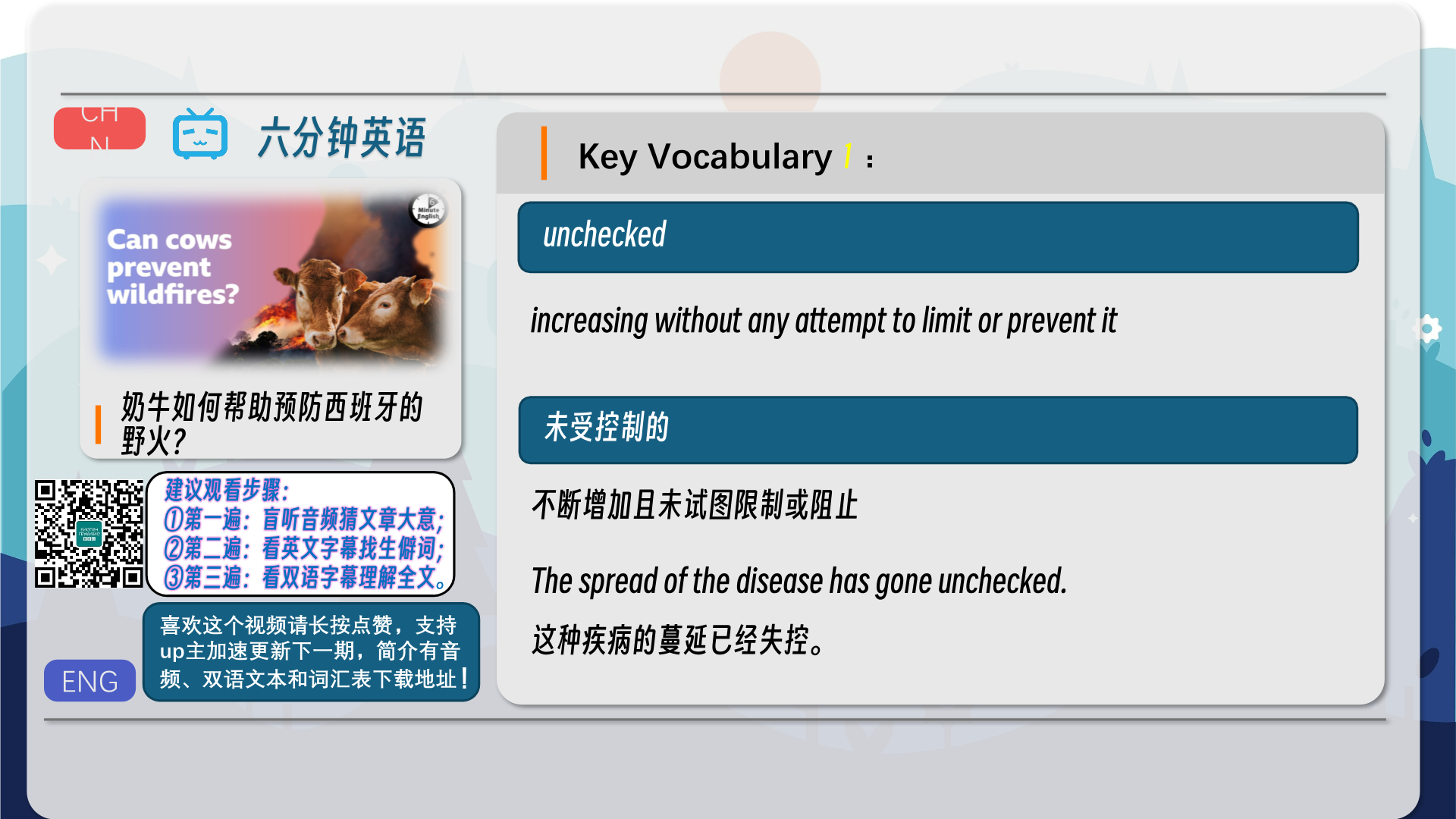
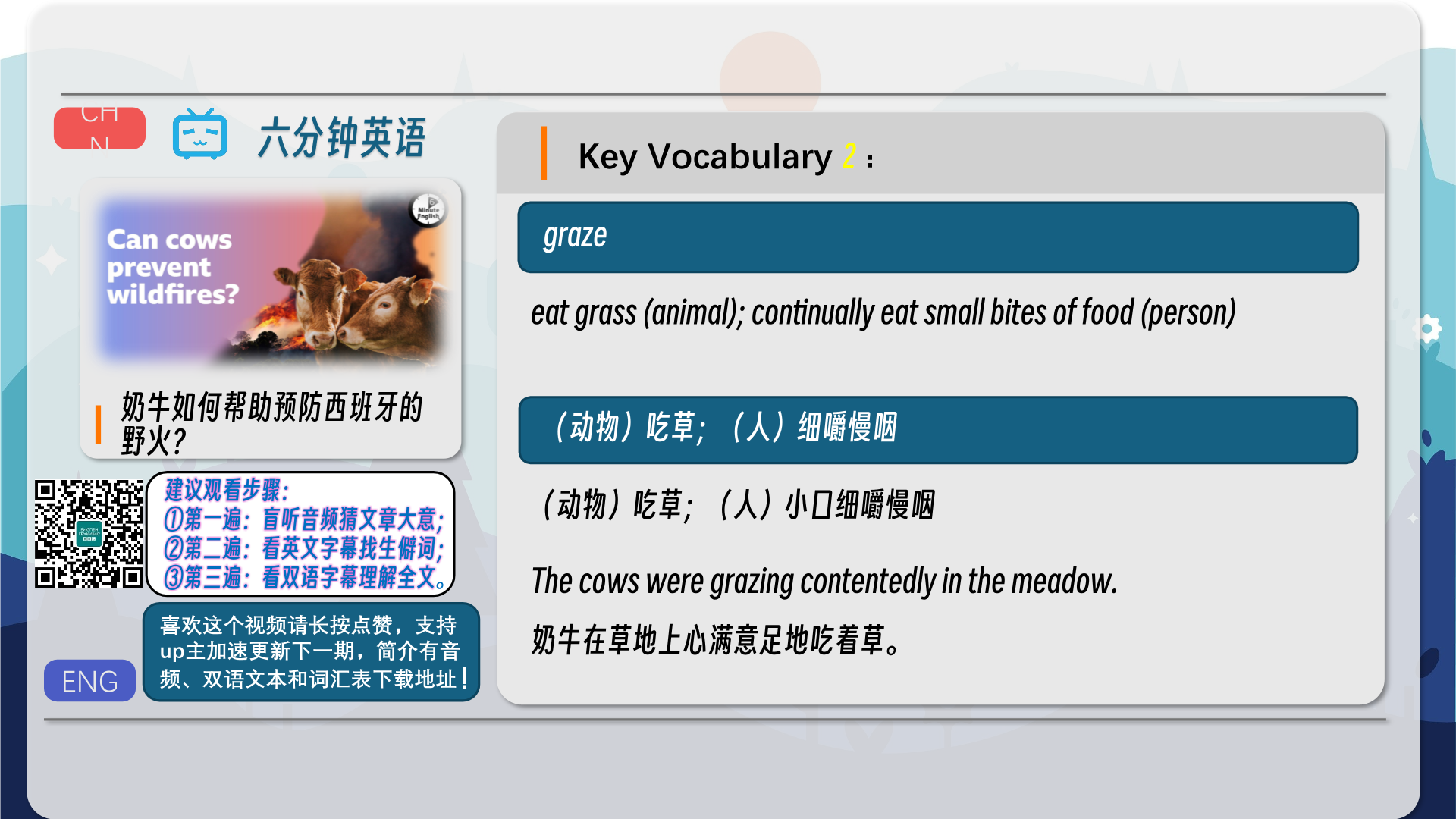
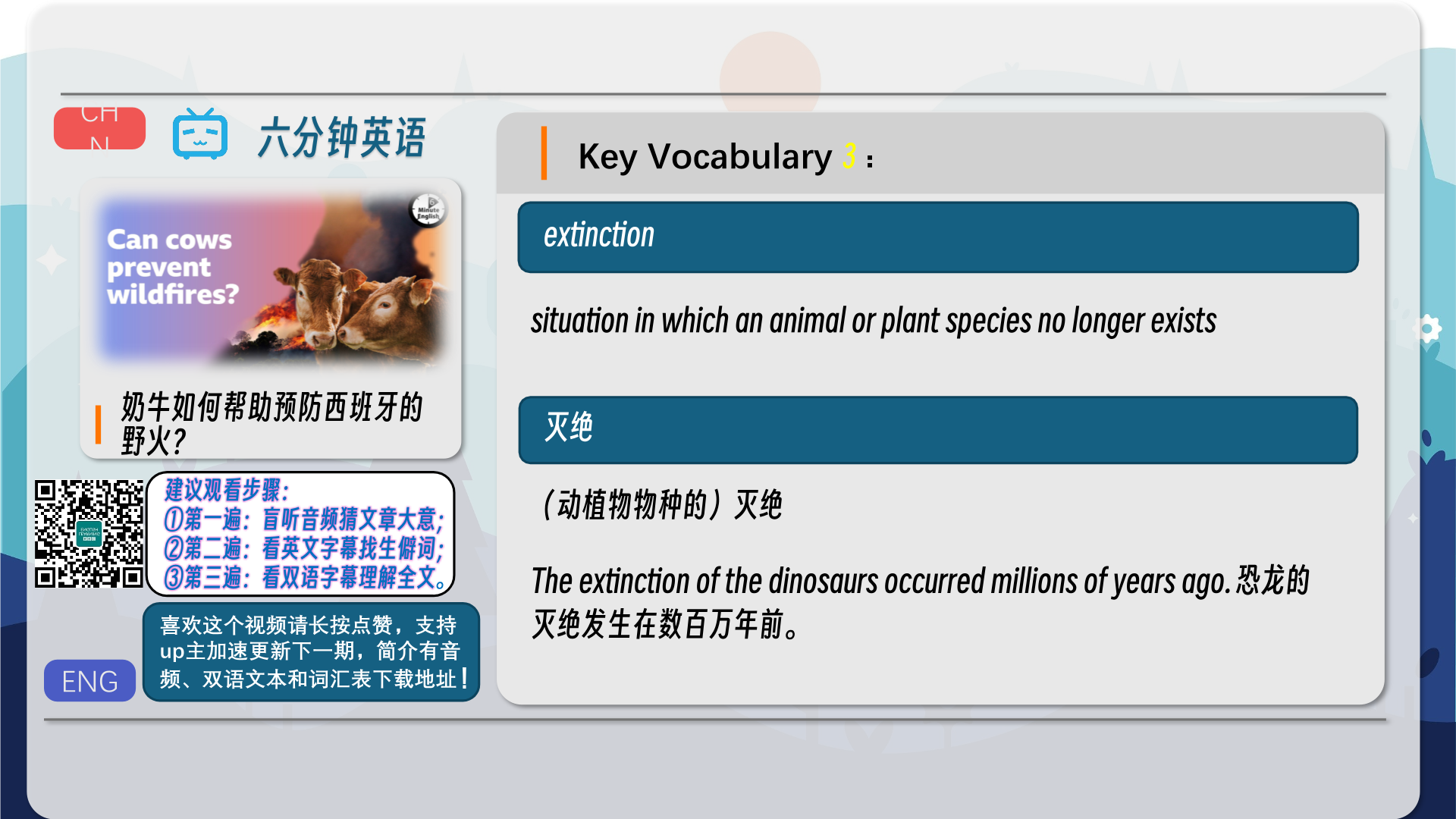
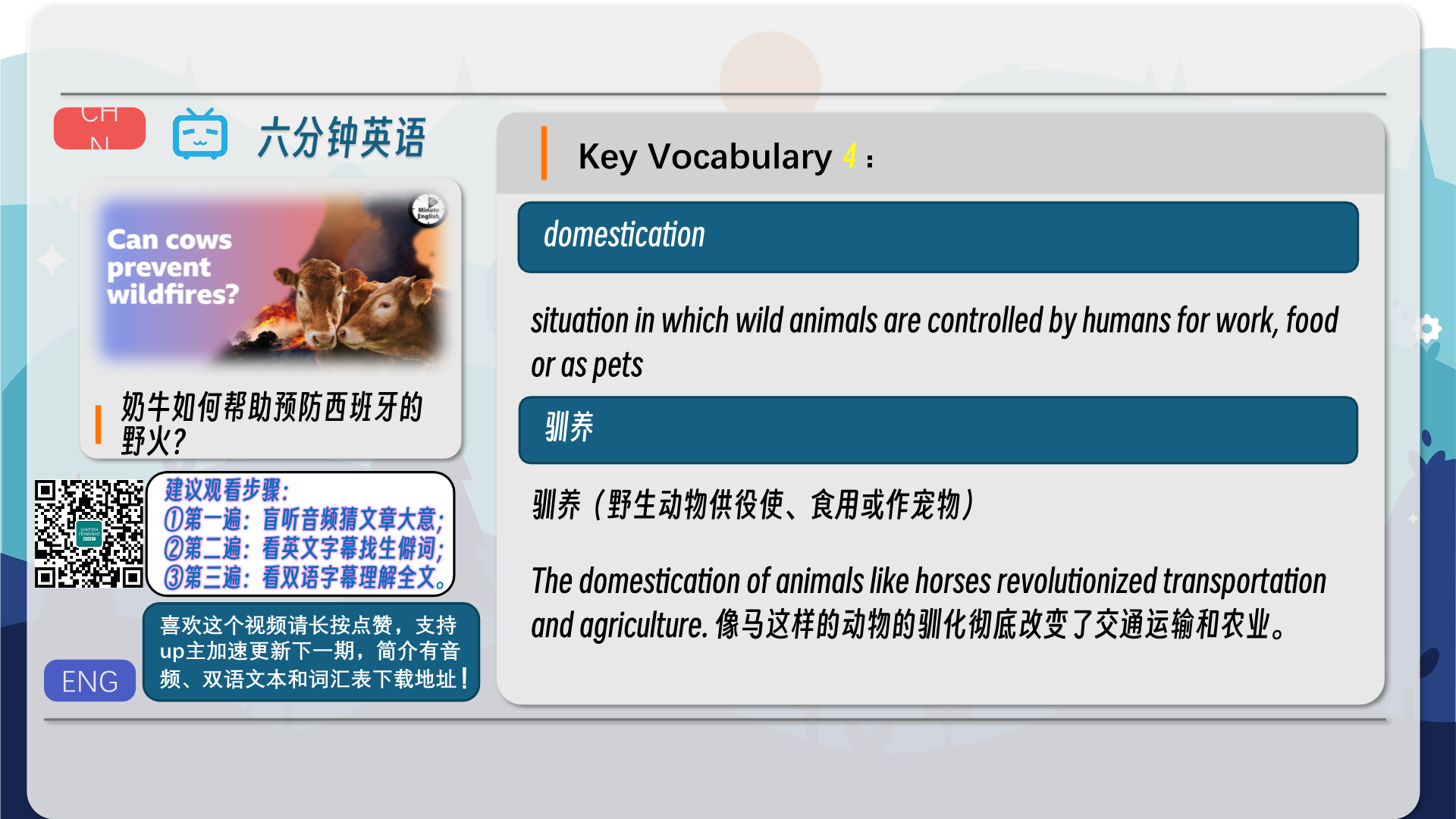
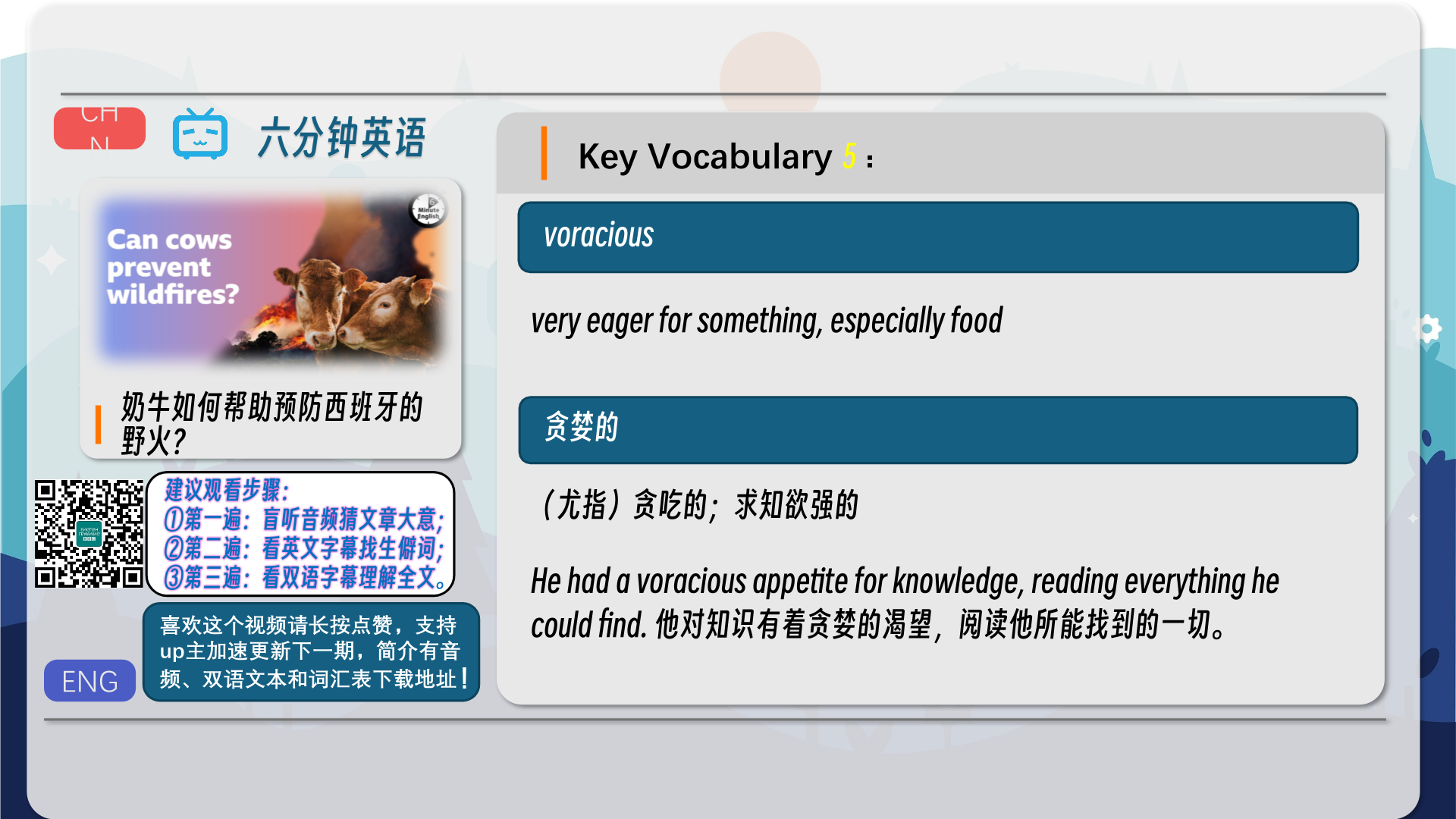
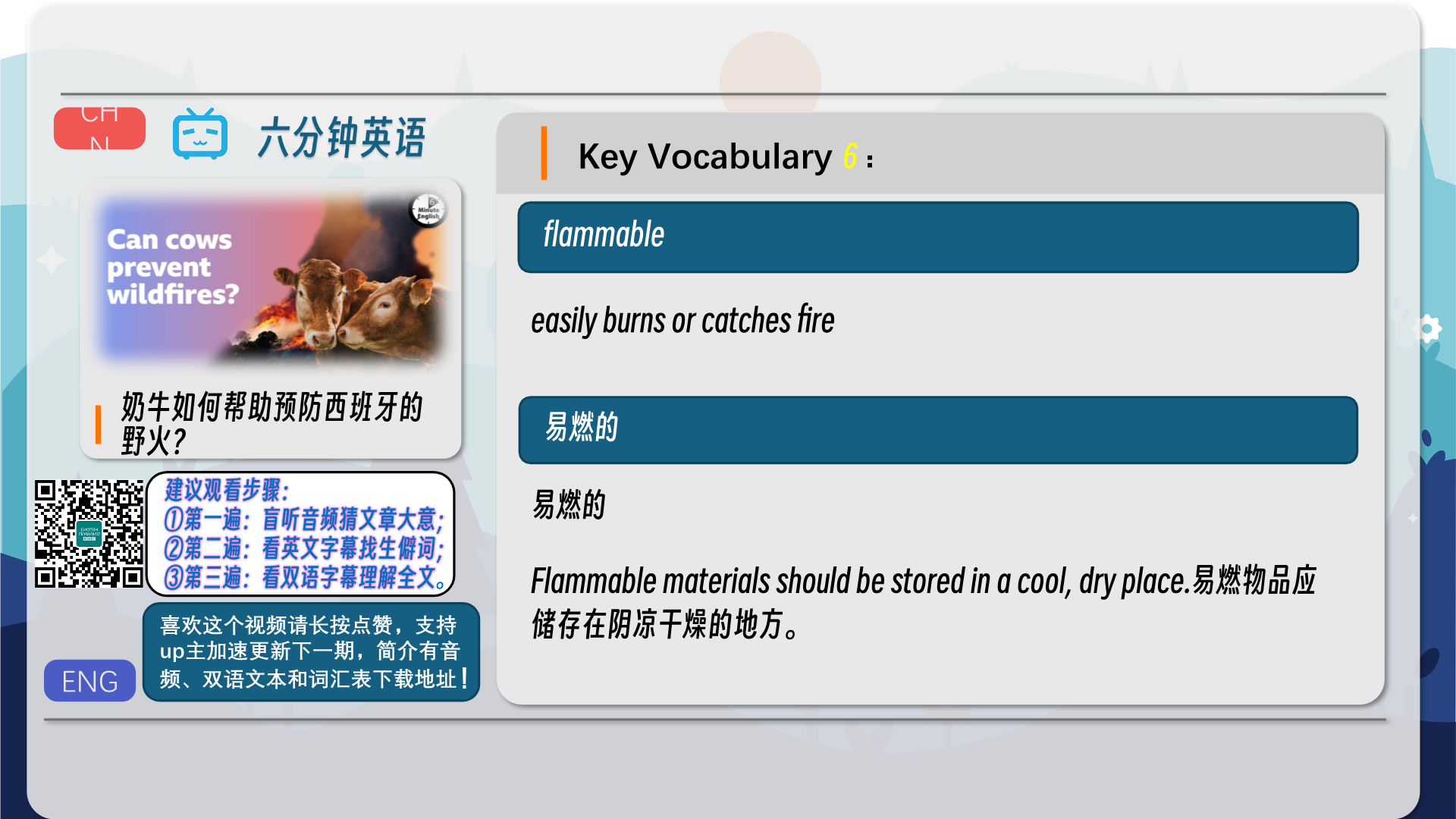
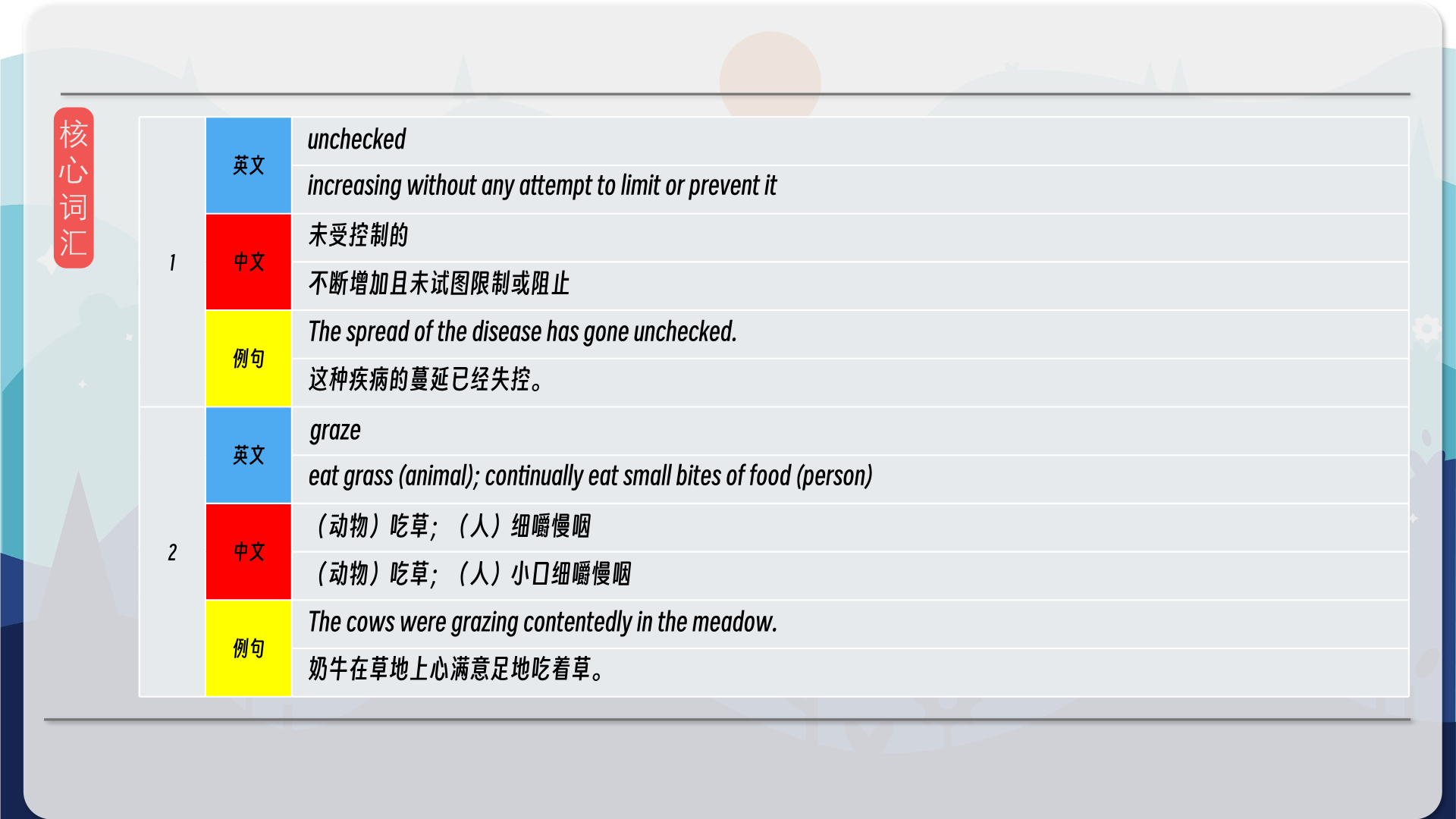
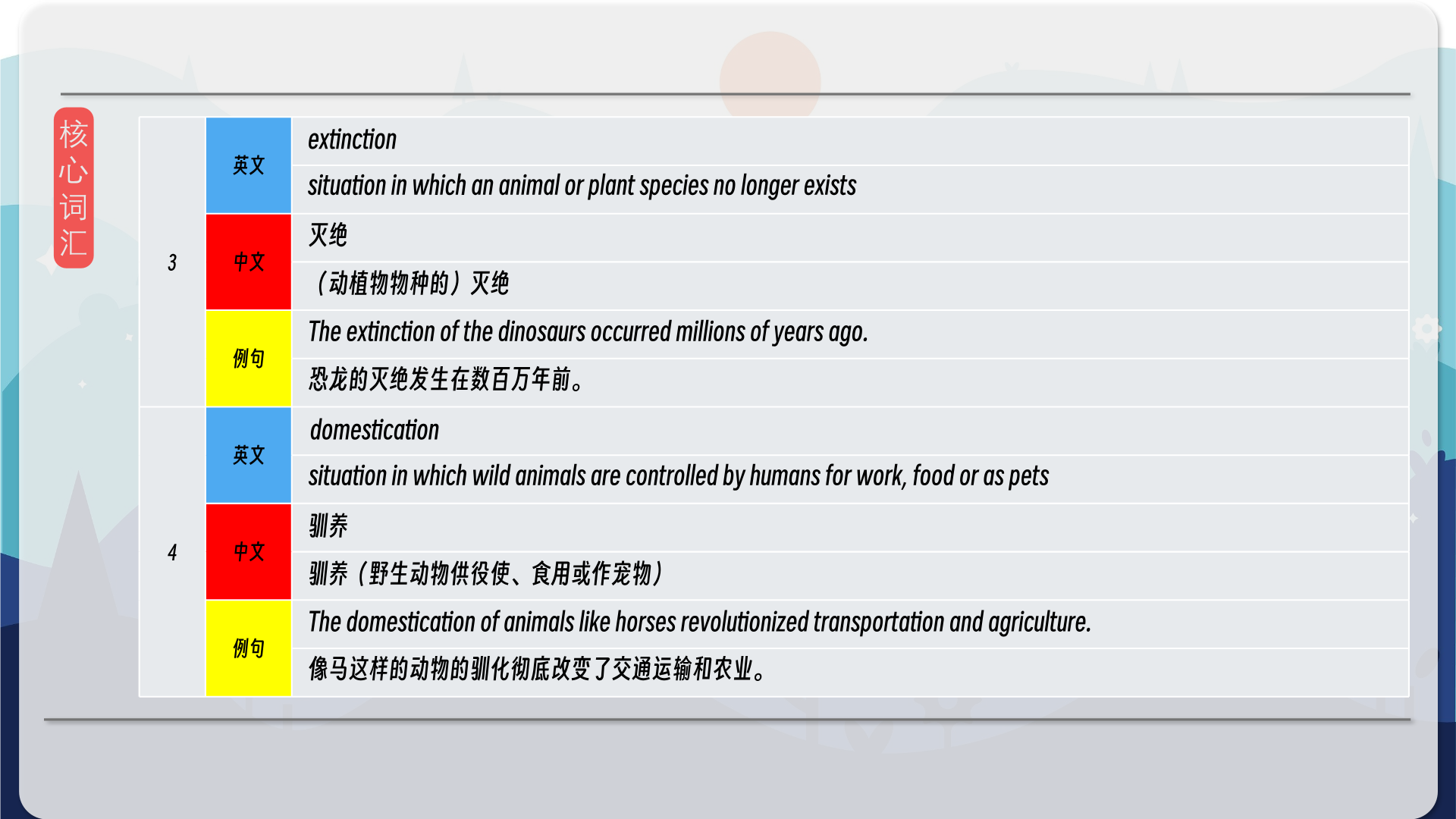
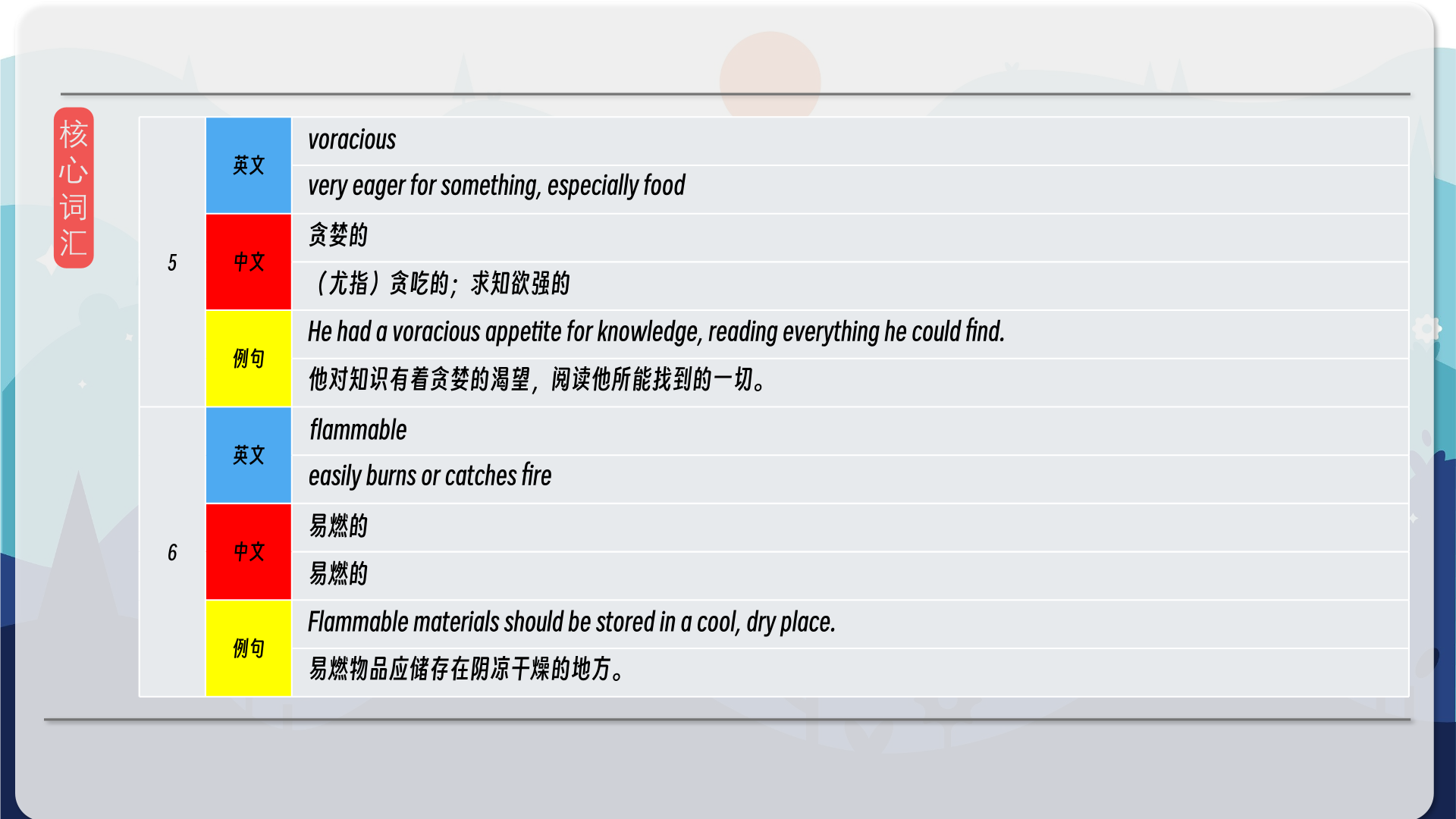
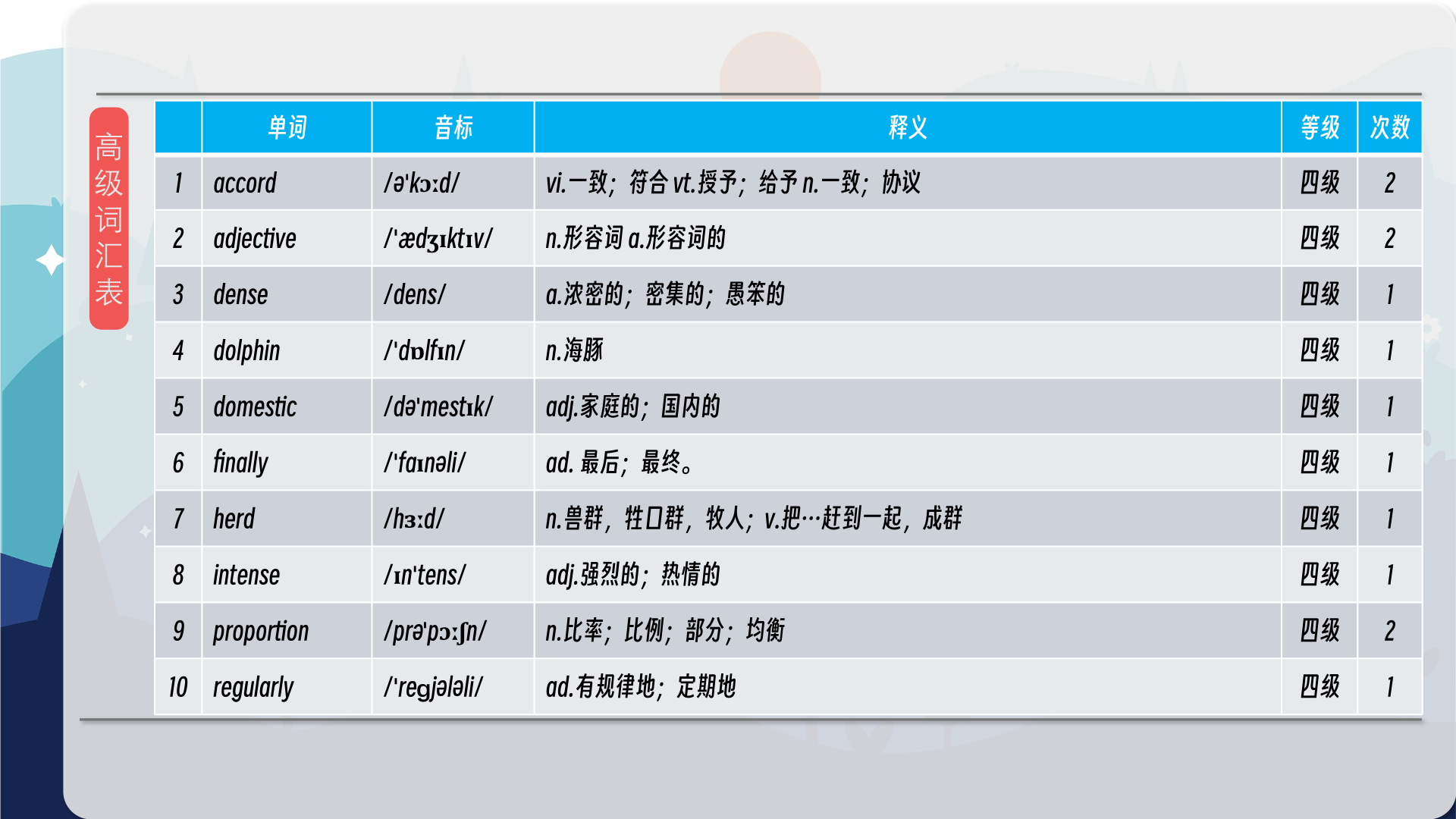
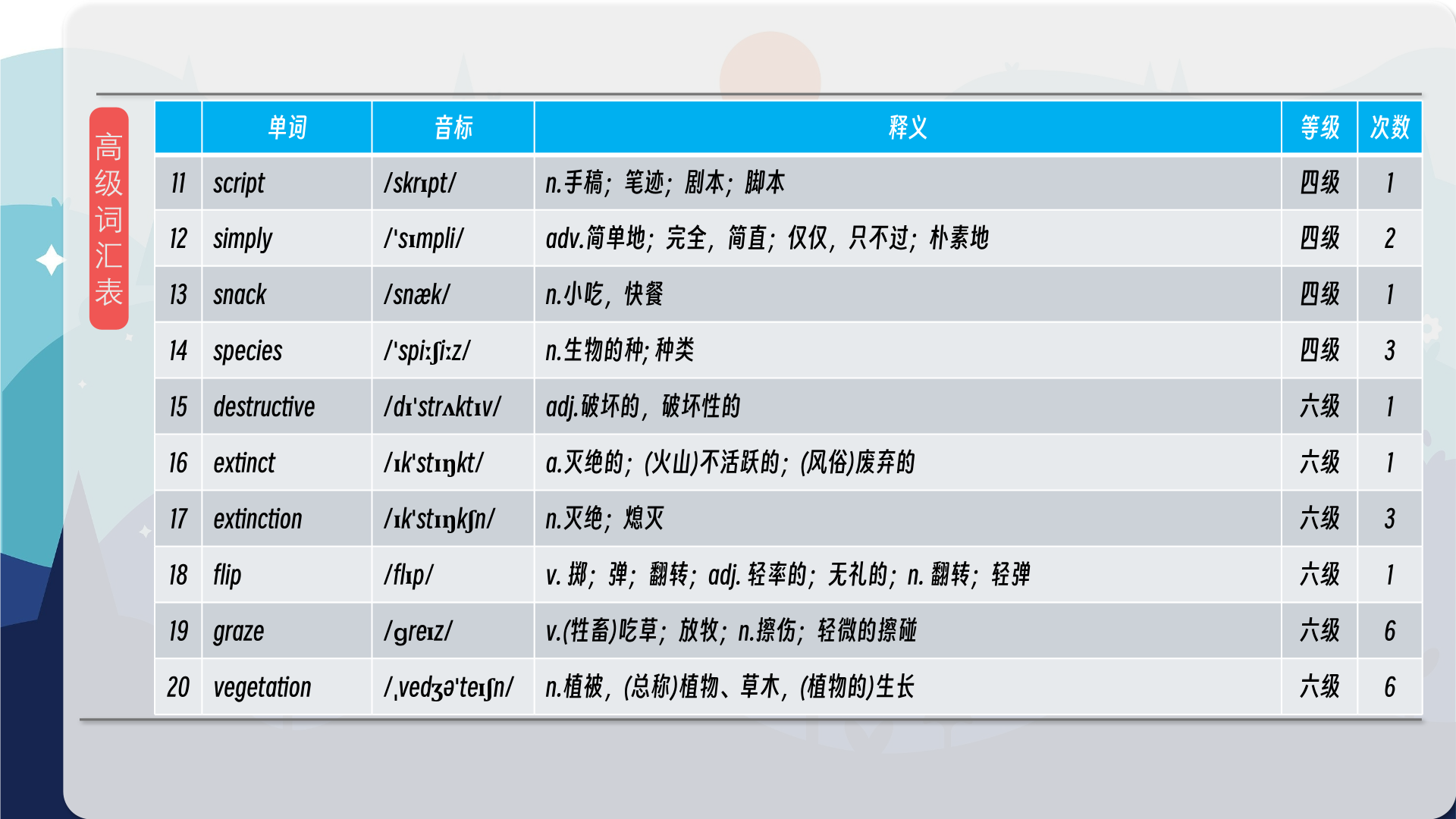
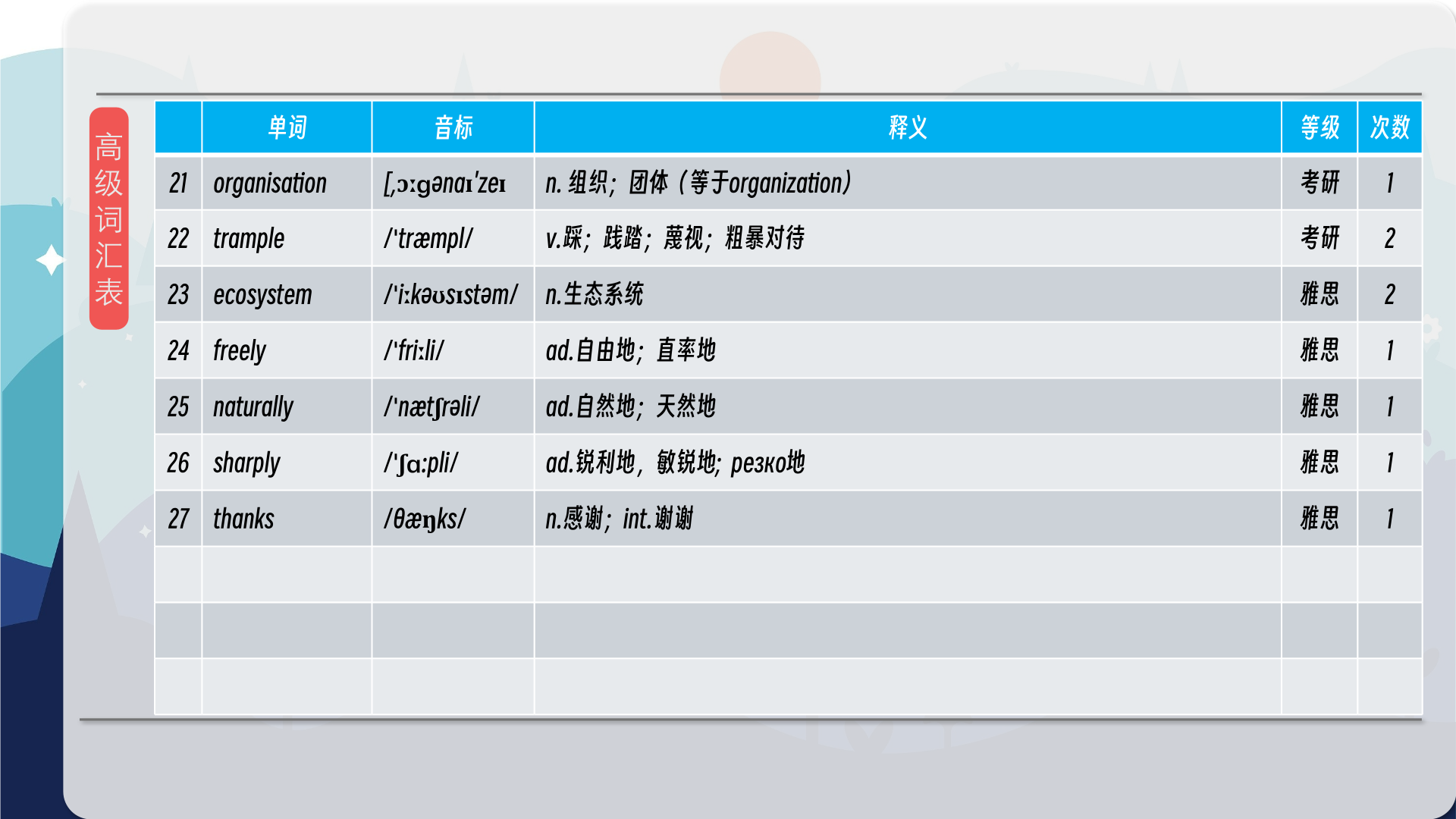

【核心词汇】
unchecked
increasing without any attempt to limit or prevent it
未受控制的
不断增加且未试图限制或阻止
The spread of the disease has gone unchecked.
这种疾病的蔓延已经失控。
graze
eat grass (animal); continually eat small bites of food (person)
(动物)吃草;(人)细嚼慢咽
(动物)吃草;(人)小口细嚼慢咽
The cows were grazing contentedly in the meadow.
奶牛在草地上心满意足地吃着草。
extinction
situation in which an animal or plant species no longer exists
灭绝
(动植物物种的)灭绝
The extinction of the dinosaurs occurred millions of years ago.
恐龙的灭绝发生在数百万年前。
domestication
situation in which wild animals are controlled by humans for work, food or as pets
驯养
驯养(野生动物供役使、食用或作宠物)
The domestication of animals like horses revolutionized transportation and agriculture.
像马这样的动物的驯化彻底改变了交通运输和农业。
voracious
very eager for something, especially food
贪婪的
(尤指)贪吃的;求知欲强的
He had a voracious appetite for knowledge, reading everything he could find.
他对知识有着贪婪的渴望,阅读他所能找到的一切。
flammable
easily burns or catches fire
易燃的
易燃的
Flammable materials should be stored in a cool, dry place.
易燃物品应储存在阴凉干燥的地方。
在公众号里输入6位数字,获取【对话音频、英文文本、中文翻译、核心词汇和高级词汇表】电子档,6位数字【暗号】在文章的最后一张图片,如【220728】,表示22年7月28日这一期。公众号没有的文章说明还没有制作相关资料。年度合集在B站【六分钟英语】工房获取,每年共计300+文档,感谢支持!